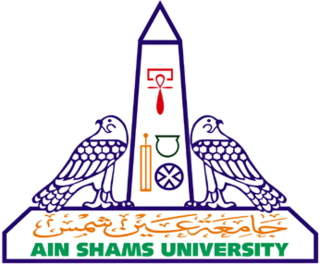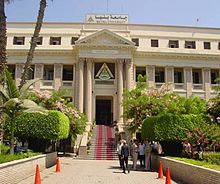
Cairo University is Egypt's premier public university. Its main campus is in Giza, immediately across the Nile from Cairo. It was founded on 21 December 1908; after being housed in various parts of Cairo, its faculties, beginning with the Faculty of Arts, were established on its current main campus in Giza in October 1929.

Ain Shams University is a public university located in Cairo, Egypt. Founded in 1950, the university provides education at the undergraduate, graduate and post-graduate levels.

Banha is the capital of the Qalyubiyya Governorate in north-eastern Egypt. Between the capital of Cairo and the city of Tanta, Banha is an important transport hub, as rail lines from Cairo to various cities in the Nile Delta pass through it and Benha it's a part of The Greater Cairo. Banha was founded as a city in 1850.

Alexandria University is a public university in Alexandria, Egypt. It was established in 1938 as a satellite of Fouad University, becoming an independent entity in 1942. It was known as Farouk University until after the Egyptian Revolution of 1952, when its name was changed to the University of Alexandria. Taha Hussein was the founding rector of Alexandria University. It is now the second largest university in Egypt and has many affiliations to various universities for ongoing research.

Tanta University is an Egyptian university in the city of Tanta, Al Gharbiyah governorate, Egypt. The university is under the direct scientific supervision of the Ministry of Higher Education.

Zagazig University is a public university located in the city of Zagazig, Egypt.
Fayoum University (FU) (Arabic: جامعة الفيوم, Jame'at al-fayoum) is a public university located in the Egyptian city of Faiyum in northern Egypt. From 1976 to 2005, Fayoum University was a public institution within the University of Cairo. In August 2005, it was established as an independent campus with 2,000 faculty members and an enrollment of about 25. 000 students. The city of Fayoum is an oasis located approximately 63 miles southwest of Cairo and is noted for its agricultural production and tourism.

Ain Shams University, Faculty of Medicine or School of Medicine, is a public Egyptian graduate school and one of the faculties of Ain Shams University. Now, it is one of the largest educational medical institutions in Africa and the Middle East. It was founded in 1947, making it the third oldest medical school in Egypt. It has promoted numerous programs of medical care to serve society, in addition to environmental development and continuous scientific research for local and international health.
It became part of Ain Shams University in 1950, when it was established after adding several faculty members. Each year, the faculty's different departments hold conferences dedicated to the recent advances in medical science.
Faten Zahran Mohammed is an Egyptian biochemist and environmental biologist, cancer biologist and toxicologist known for her work on the anti-tumoral effects of snake venom and iodoacetate. She is currently Professor of Biochemistry at Zagazig University, Egypt, head of the Biochemistry Division, Faculty of Science, and a member of Egyptian Universities Promotion Committees "EUPC".

Muhammad Metwalli al-Sha'rawi was an Islamic scholar, former Egyptian minister of Endowments. He has been called one of Egypt's most popular and successful Islamic preachers, and "one of the most prominent symbols of popular Egyptian culture" in the 1970s, 1980s and 1990s.

Ashraf Mohamed El Shihy, is an Egyptian politician, the Minister of Higher Education and Minister of Scientific Research, under President Abdel Fattah El-Sisi and the government of Sherif Ismail.
Minya al-Qamh is the capital of the eponymous markaz (county) in the Nile Delta governorate of Sharqia, Egypt. The markaz is home to 11 local units, 82 villages, and 245 hamlets. In 2017, the Minya al-Qamh markaz was home to 769,333 people, while city had 87,875 residents.
Ayman Al-Hendy, is a professor and director of translational research from Department of Obstetrics and Gynecology, University of Chicago. His branch of medical/surgical knowledge is obstetrics and gynecology, particularly in the spheres of “gene/stem cell therapy”, “reproductive genetics”, and “stem cell biology”.
Mahmoud Ezzat Ibrahim is the former acting general guide of the Muslim Brotherhood in Egypt and one of the most prominent leaders of the Muslim Brotherhood. Historian Fawaz Gerges describes his role as "akin to chief of staff of the Ikhwan [Muslim Brotherhood]."

Zahira Hafez Abdin, was an Egyptian paediatrician and specialist in rheumatic heart disease, known as the "Mother of Egyptian Medicine." She is also known for her extensive charitable work.

Muhammed Muhammed Gwady was an Egyptian academic, whose discipline included medicine, literature, history, criticism, language and political and developmental ideology. He was also a professor of cardiology at Zagazig University in Egypt.













